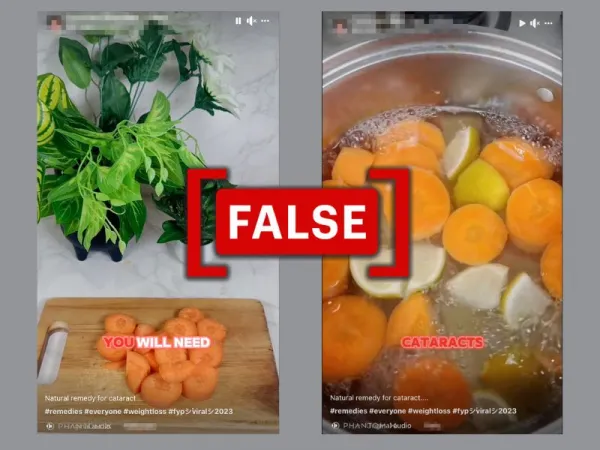By: Iryna Hnatiuk
March 11 2024
 Screenshot of the viral claim shared online, suggesting a natural remedy consisting of carrots, limes, and water can help eliminate cataracts. (Source: Facebook/Modified by Logically Facts)
Screenshot of the viral claim shared online, suggesting a natural remedy consisting of carrots, limes, and water can help eliminate cataracts. (Source: Facebook/Modified by Logically Facts)
A viral post inaccurately claims a natural remedy with carrots, limes, and water can cure cataracts. However, the only effective treatment is surgery.
Context
A Facebook post claims that a natural remedy consisting of carrots, limes, and water can help eliminate cataracts and improve eyesight. The page that posted the claim had 41,000 followers at the time of writing.
However, while being beneficial for eye health, neither these ingredients nor other natural remedies can cure cataracts. The only effective treatment is surgery.
The video shared on Facebook Reels demonstrates the preparation and use of a "natural remedy for cataracts" to eliminate "blurred vision" and the need for glasses. It suggests boiling a mixture of a carrot, lime, and water, then straining and consuming a glass of the liquid after breakfast to cure cataracts and vision problems.
However, cataracts cannot be cured naturally; surgery is the only effective treatment.
In fact
The American Academy of Ophthalmology defines cataracts as the clouding of the eye's usually clear lens behind the pupil. Symptoms include cloudy or blurry vision, poor night vision, double vision, faded colors, and increased nearsightedness. Cataracts are primarily age-related, affecting over half of all Americans by age 80.
According to Johns Hopkins Medicine, cataract-induced vision loss might be mitigated with new eyeglasses, magnifying glasses, or better lighting in its early stages. However, surgery is the only effective solution when these measures fall short. Cataract surgery is among the safest and most effective surgical procedures.
Vered Hazanchuk of the American Academy of Ophthalmology told Logically Facts, "Cataracts can be removed only with surgery. If your cataract symptoms are not bothering you much, you don’t have to remove them. You might need a new eyeglass prescription to help you see better. You should consider surgery when cataracts keep you from doing things you want or need to do.”
Carrots and limes, used in the video, are indeed natural antioxidants, and the Academy agrees that a diet rich in foods with antioxidants may reduce the risk of developing cataracts by slowing down oxidation — the cause of aging or cell death.
The University of Utah Health states that what we eat impacts our eye health. In addition to carrots and limes, other vegetables, fruits, cold-water fish, eggs, beans, nuts, lean red meats, and poultry contribute to better vision at all stages of life.
However, it is crucial to understand the difference between possible prevention or slowing down and curing the existing problem.
Research into natural treatments of cataracts is ongoing, and some of these treatments, including N-acetylcysteine amide (NACA) eye drops and oxysterol, showed promising results. However, these tests are still in the early stages of research and were only run on animals. Therefore, more research is necessary into these natural cataract treatments to determine if they will be effective on humans.
The verdict
A diet rich in vitamins and minerals may prevent or decelerate cataract development. While carrots and limes, as natural antioxidants, may contribute to this preventive measure, no natural ingredients can cure existing cataracts or restore sight. Surgical treatment is the only proven solution. Thus, we have marked this claim as false.